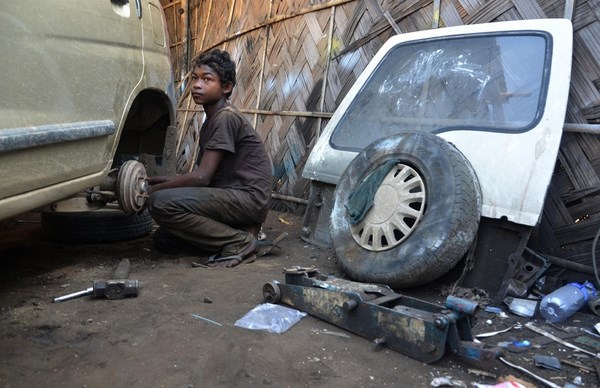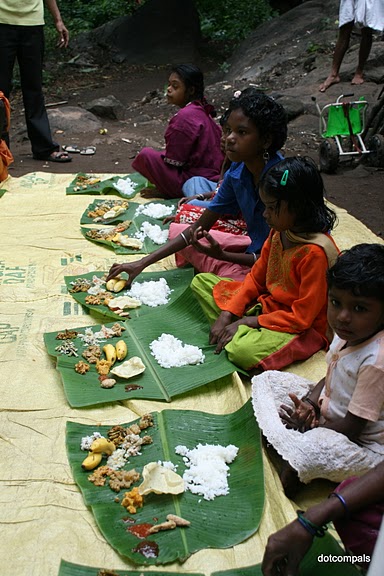 For Indian bloggers on Blog Action Day on 16 October, a day in which thousands of bloggers from around the world write on a single topic, this year's theme of #humanrights hit home.
For Indian bloggers on Blog Action Day on 16 October, a day in which thousands of bloggers from around the world write on a single topic, this year's theme of #humanrights hit home.The fight for human rights in India, where child labor, indigenous exploitation, entrenched stereotypes and other violations remain a problem, is far from over, they wrote.
Richa Singh shed light on the lack of human rights considerations in the tourism sector, especially involving the indigenous population:
Safari. Human. Human safari. What do these two words explain to you? Put etymology to it and despite that, the worrisome details of this 'trip' will not be exposed. Jarawa tribes. Andaman Nicobar islands. Does this not bring to mind the gory details of that video which went viral all over the internet and finally surfaced on the news channels. Fifteen thousand rupees (US $250) that's it. That is all it took a couple of people to go on a human safari. Where they could watch scantily clad women dance, men beg for food and of course poor children also not spared in this. This particular tribe has been an endangered species for quiet sometime. And Supreme Court of India has repeatedly been demanding a closure of the highway which leads to their inhabited areas. But govt has been reluctant to follow through because there could be possible 'connectivity' issues.Irish expatriate blogger Maria Perry Mohan, a blogger and mother of four who lives in India, focused on child labor in India:
Because India is in the far east and is technically what is known as a developing country, westerners find it very hard to believe that many people here live in unimaginable comfort. There are kids who have laptops, access to modern educations aids, smartphones, pizza delivery, digital television, even a fancy vehicle to move around in - you name it, they have it. The very same kids often live in homes where there is flagrant use of child labour. I kid you not. Because of the profusion of dust, the harsh climate and a cooking system which is still quite labour intensive, pressure cookers notwithstanding, a housewife's work is never, ever done. So for those who can afford it, domestic help is a must.
 |
| Rahul, 15 years old, works in a garage in Dimapur, Nagaland, India. Image by Caisii Mao. Copyright Demotix (12/6/2013) |
Despite progressive legislations and zealous spread of awareness, conflicts and vagaries arise when human rights of the mentally ill are under question, not just in India but universally. [..] Grey areas remain in the legal technicalities and implementation, questions of ethics and professionalism. Grey areas are also housed within our own minds, and mentalities, in our social attitude towards our mentally ill. These being the two biggest deterrents in ensuring human rights of the mentally ill.Rajlaksmi talked about discrimination based on skin color and body size. She asked:
How about just being human for a while, accept and appreciate people for what they are?
 |
| Image by Prashanth Randadath. Copyright Demotix. (24/8/2010) |
Kalpana Solsi commented on education and the amount of work that remains to be done to perfect the sector. Despite implementing the Right To Education Act and the recognition of education as a basic right, there are many illiterate people in India.* Eat to live ; and not live to eat. Don't make food the focal point of your life every single day
* Don't throw away food. Learn ways to re-use as-is or in new ways. There are so many interesting things one can do with left-overs. Google it!
* You have the power to control food waste - Stop your friend from doing it
* Skip a meal 1 time in a week. It can be the fodder for someone else, and does wonders to your perspectives on "food"
* At a regular frequency, sponsor the meal of someone who can't afford it (In your community, in a religious place, in a social welfare group, etc.)
Journalist Vishal Bheeroo blamed the lack of political awareness for failing to ensure universal human rights in India:
Today, the fight for universal human rights is a real challenge since there are so many people who are deprived of proper meal, exploited by the middlemen, don’t have access to good education, proper sanitation and healthy living. They are also deprived of justice and fairness in society because of their social, caste or sex status. It’s a tragedy since lack of political willingness and mindset in the system permeates discrimination in society. Can we call ourselves Free? I’m sorry to say no and universal human rights seems to be a distant dream.You cannot ignore human rights because human life matters. It's not just about the state of being alive, but also the quality of life. Bloggers Shilpa Garg and Rainbow Hues collaborated on publishing the UN Universal Declaration of Human Rights in simple language, courtesy of Youth for Human Rights.
There are 30 human rights that are not optional, including the right to life, no torture, no discrimination, the right to an education, and a free and fair world for all. Everyone deserves them, and no one can take those rights away. As Nischala says:
BE HUMAN first The RIGHTS will FOLLOW It starts with YOU!Please check the Write Tribe for links to more posts on Blog Action Day 2013.
First Published in Global Voices Online
























0 comments:
Post a Comment